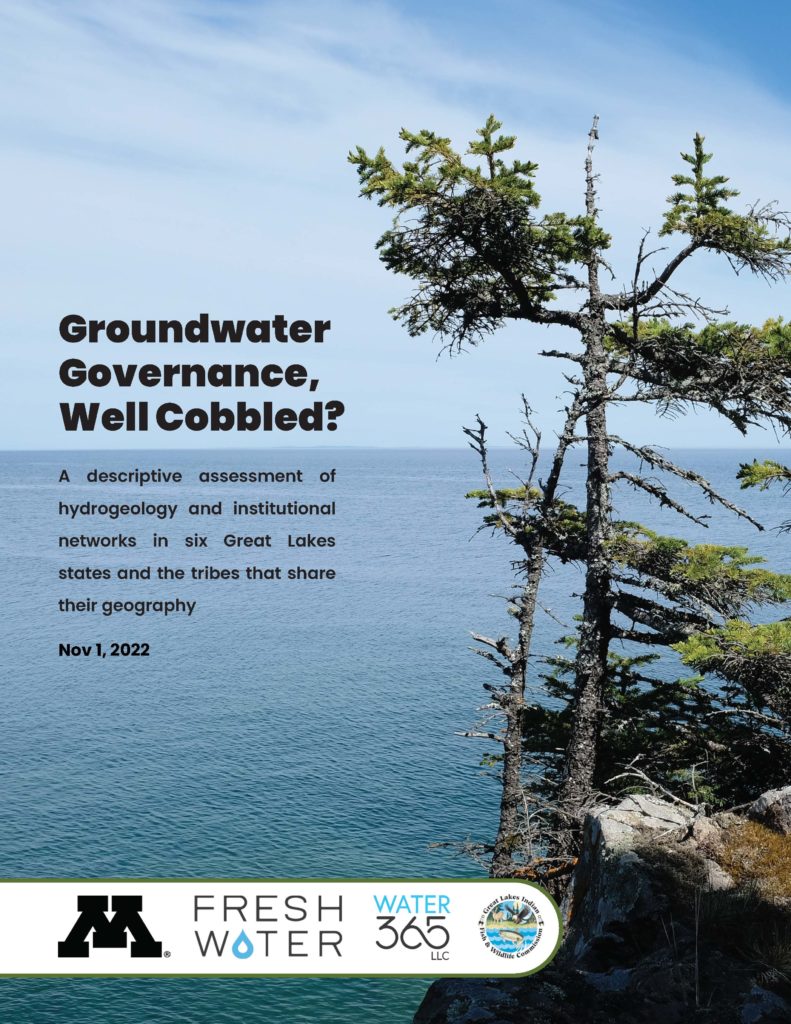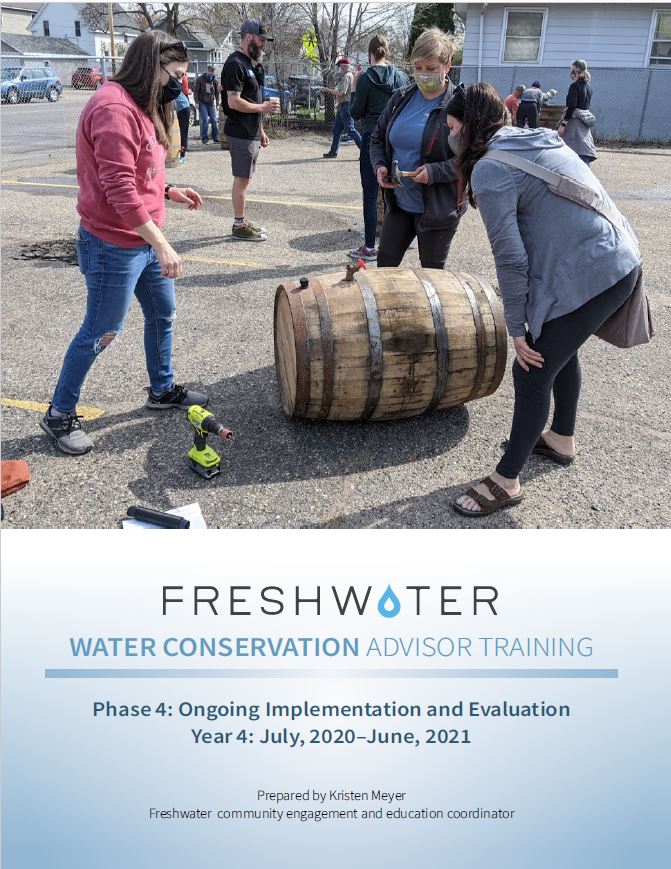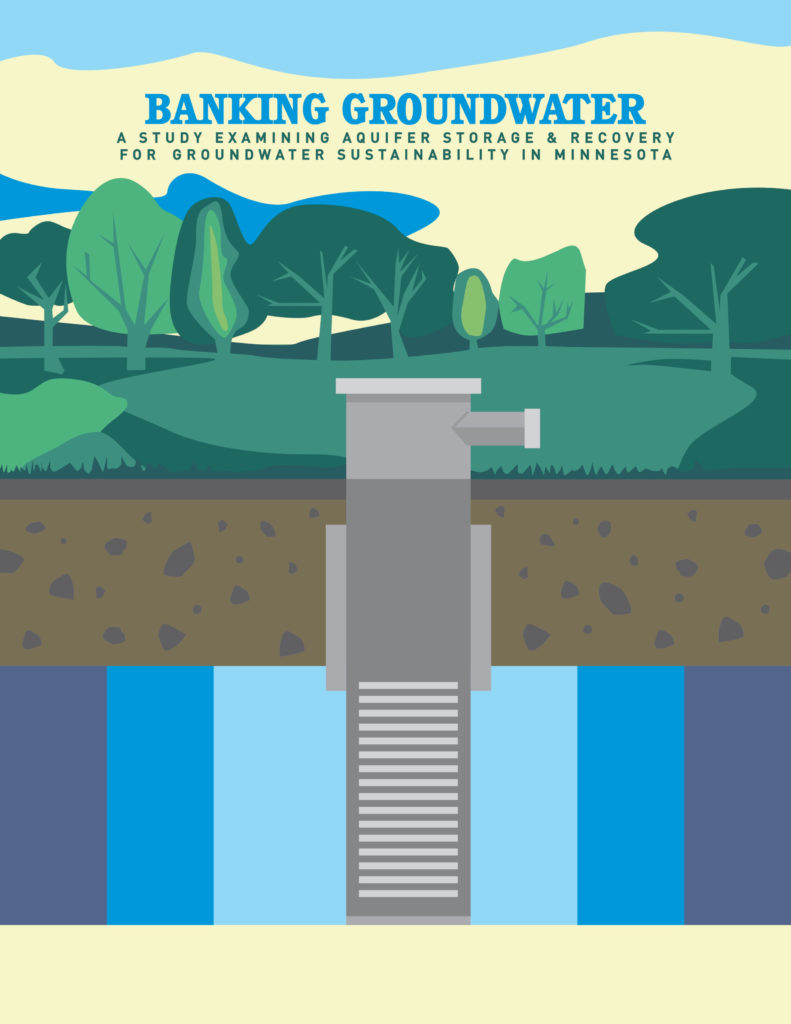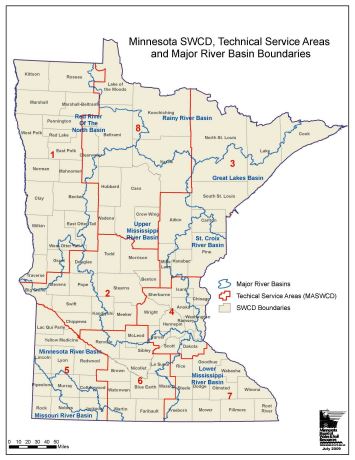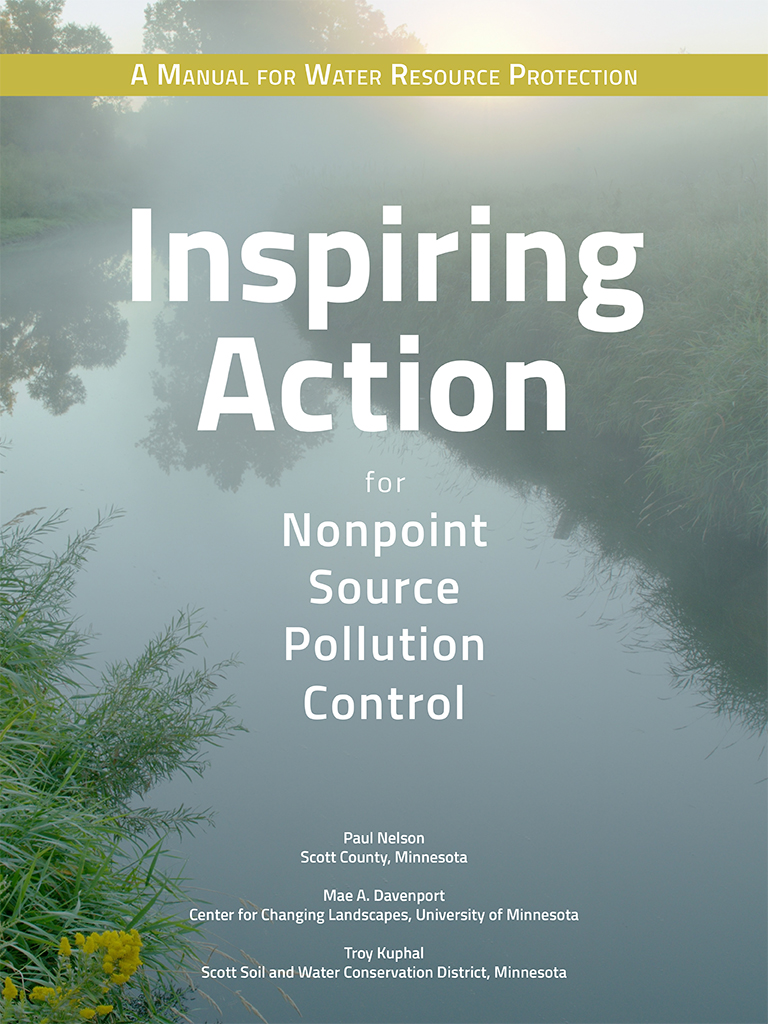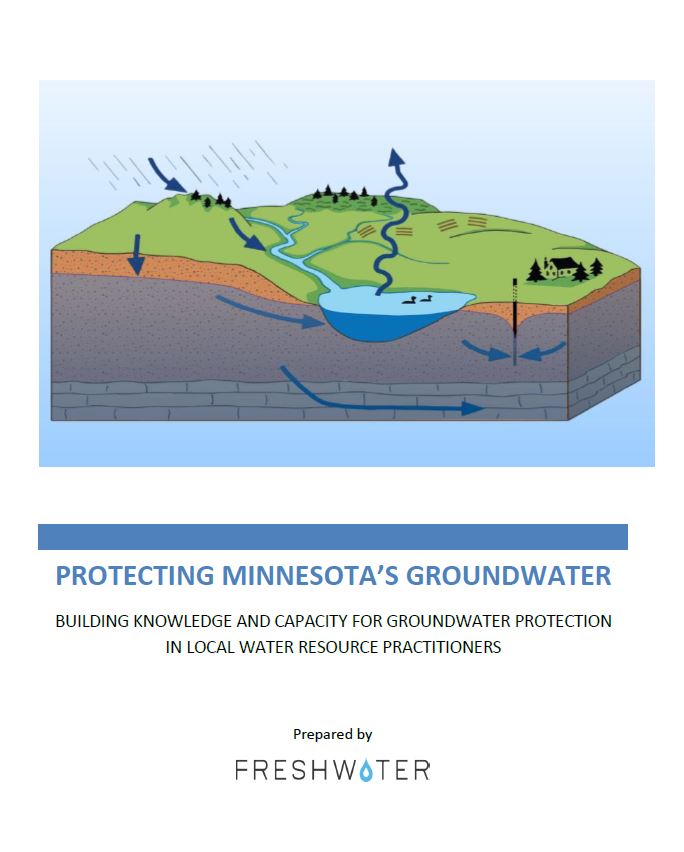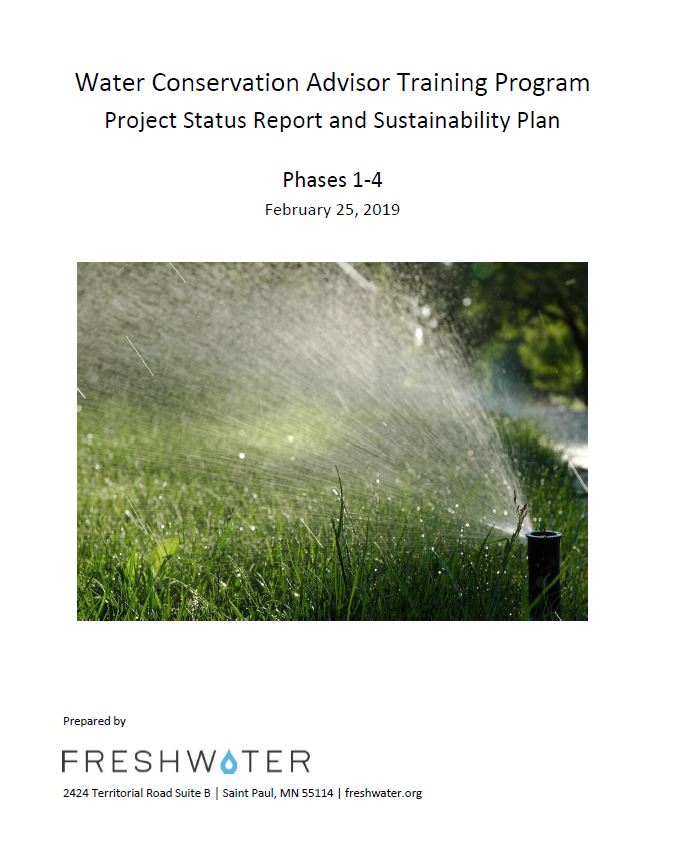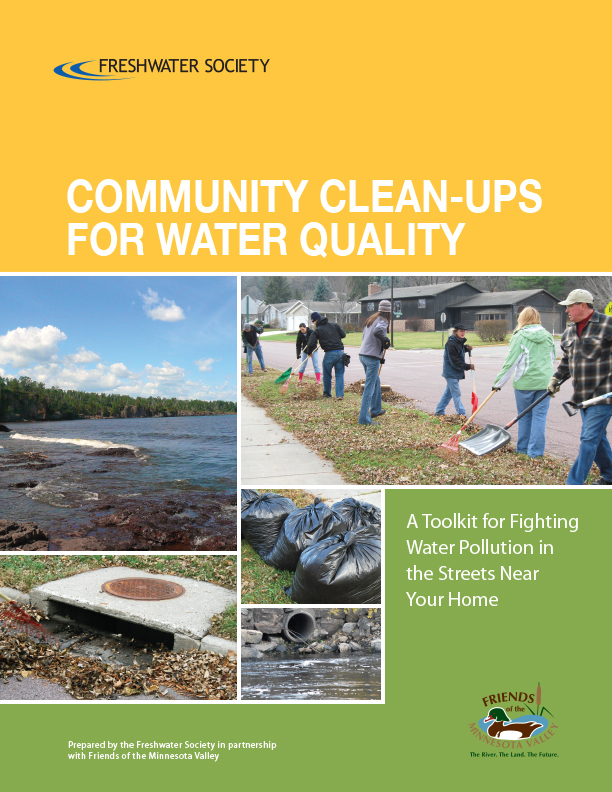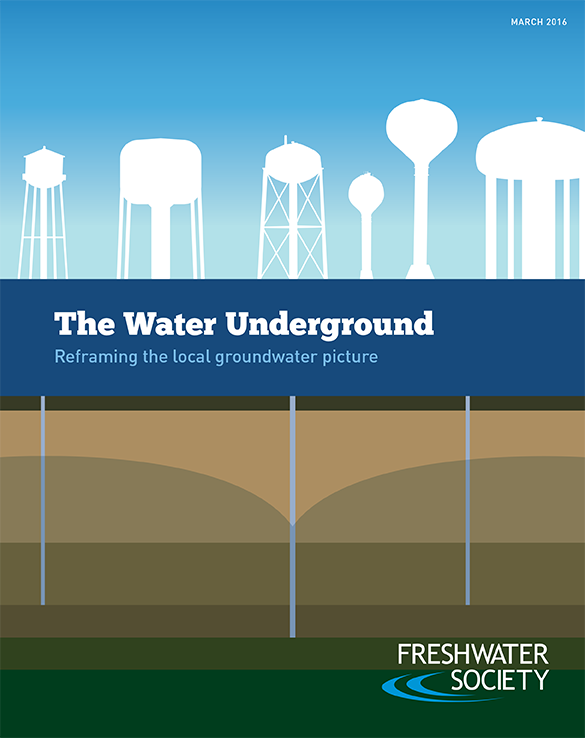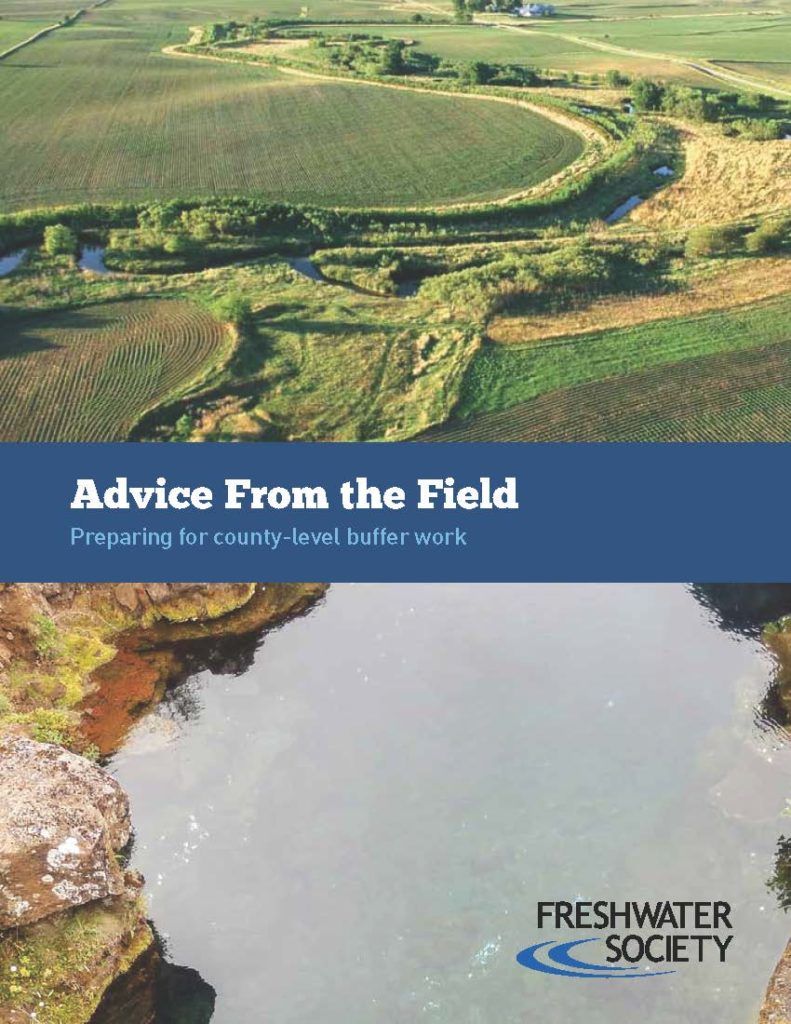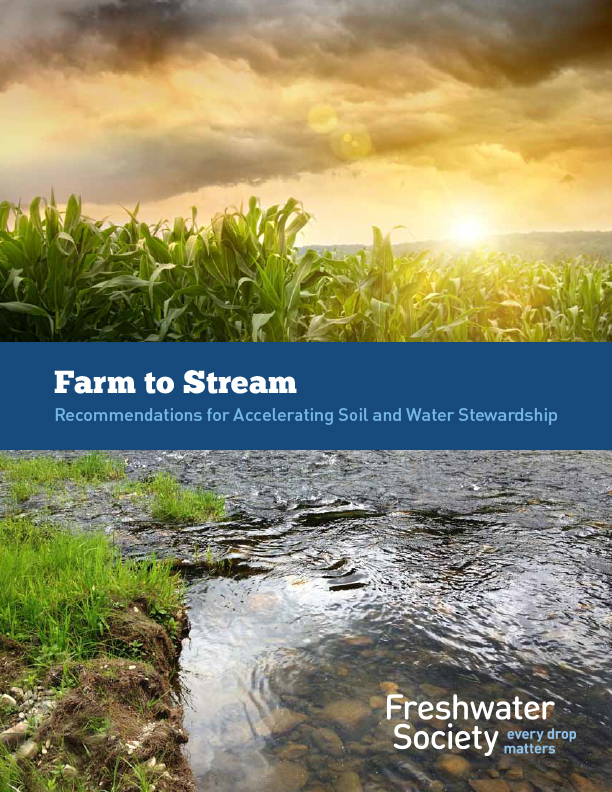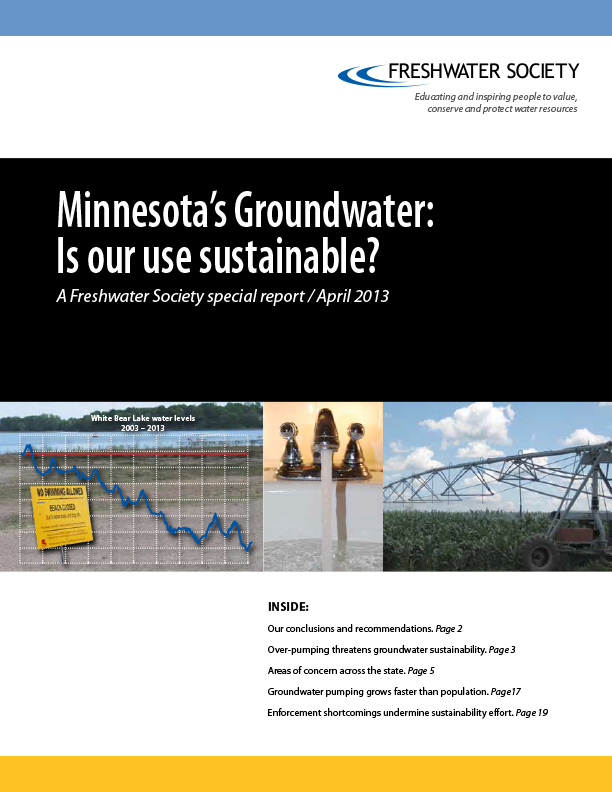Freshwater regularly publishes information on water research, environmental policy, and community needs and perceptions about water. Explore the reports below to learn more about our work.
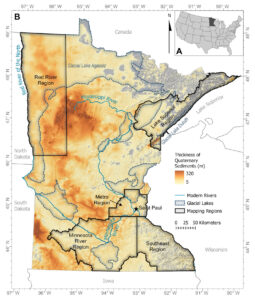 2024-2033 Factors influencing landslide occurrence in low-relief formerly glaciated landscapes (May 2025)
2024-2033 Factors influencing landslide occurrence in low-relief formerly glaciated landscapes (May 2025)
The Minnesota landslide inventory and susceptibility analysis represents a decade of work between Freshwater and numerous partners with expertise in glacial geology and public safety. By mapping nearly 10,000 landslides in five regions, the study offers a broad assessment of these hazards across the state. The project began at the Minnesota DNR in 2014 and was carried forward with Hennepin County Emergency Management. A statewide effort was then funded by the Environment and Natural Resources Trust Fund with partners including the U.S. Geological Survey, University of Minnesota, University of Minnesota Duluth, North Dakota State University, University of Wisconsin-Superior, Winona State University, Gustavus Adolphus College, St. Thomas University, University of North Dakota, and Minnesota State University, Mankato. View the report.
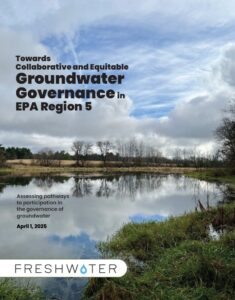 Towards Collaborative and Equitable Groundwater Governance in EPA Region 5 (April 2025)
Towards Collaborative and Equitable Groundwater Governance in EPA Region 5 (April 2025)
Freshwater completed the second phase of a multi-year project to advance groundwater governance in the Great Lakes region. A key focus was to amplify Tribal government perspectives and indigenous leadership in groundwater management. Currently, the laws, regulations, ordinances and policies governing the use of groundwater in Tribal, federal, state and local jurisdictions throughout EPA Region 5 are not well-connected. This report lays out best practices and existing barriers in hopes of developing regional groundwater governance systems based on common understanding that fosters inclusive prosperity, ecological health, and repairs past harm, while being resilient to climate and population stresses over the next generation. View the report.
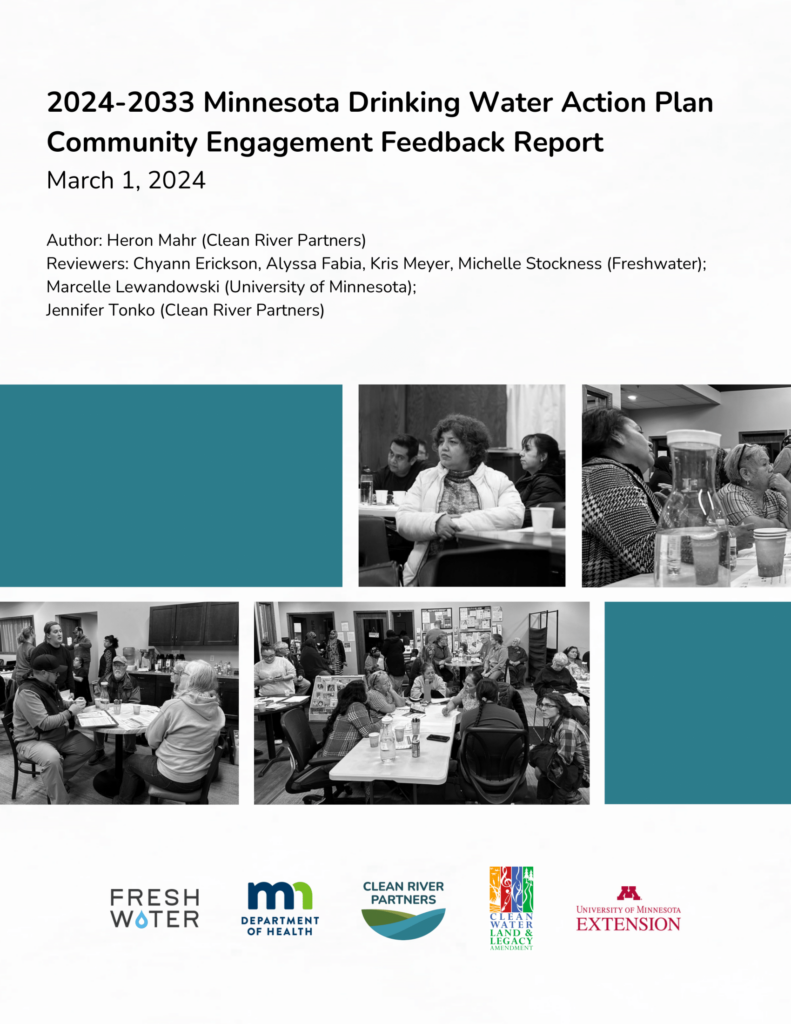 2024-2033 Minnesota Drinking Water Action Plan Community Engagement Feedback Report (March 2024)
2024-2033 Minnesota Drinking Water Action Plan Community Engagement Feedback Report (March 2024)
The Minnesota Department of Health (MDH) is currently developing a 10-year drinking water plan to better manage drinking water in Minnesota, and Freshwater played a key role in engaging water professionals and the broader statewide community. This report gathered input from 190 residents across seven Minnesota communities of their thoughts on drinking water. View the report.
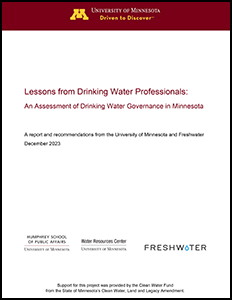 Lessons from Drinking Water Professionals: An Assessment of Drinking Water Governance in Minnesota (December 2023)
Lessons from Drinking Water Professionals: An Assessment of Drinking Water Governance in Minnesota (December 2023)
The Minnesota Department of Health (MDH) is currently developing a 10-year drinking water plan to better manage drinking water in Minnesota, and Freshwater is playing a key role in engaging water professionals and the broader statewide community.
Freshwater worked with the MDH, University of Minnesota’s Water Resources Center, the Humphrey School of Public Affairs and Clean River Partners to host a series of focus groups centered around drinking water management and governance. View the report.
Groundwater Governance, Well Cobbled? (November 2022) Ground water is a crucially important but often overlooked resource in the Great Lakes region. As a common-pool resource, the region's aquifers should have a well-structured set of governing principles to guide their sustainable and equitable use. We ask, “but do they?” Read the full report here.
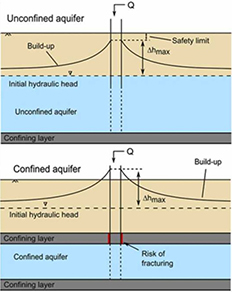 Aquifer-scale mapping of injection capacity for potential aquifer storage and recovery sites: Methodology development and case studies in Minnesota, USA (April 2022)
Aquifer-scale mapping of injection capacity for potential aquifer storage and recovery sites: Methodology development and case studies in Minnesota, USA (April 2022)
Published in the Journal of Hydrology: Regional Studies, this peer-reviewed paper is a result of our Banking Groundwater report developed in collaboration with the University of Minnesota. View the paper.
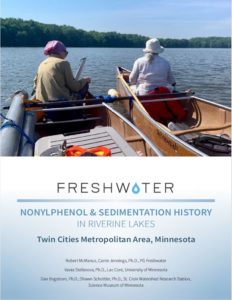 Nonylphenol & Sedimentation History in Riverine Lakes, Twin Cities Metropolitan Area, Minnesota (July 2021)
Nonylphenol & Sedimentation History in Riverine Lakes, Twin Cities Metropolitan Area, Minnesota (July 2021)
This study was designed to investigate the occurrence in the environment of a class of compounds, Nonylphenol and many nonylphenol ethoxylates that have been used since the 1940s as detergents and surfactants, among other things. They are known endocrine disruptors and can be produced in wastewater treatment plants. The goal was to document the current concentrations of NP and NPEs within the Twin Cities’ metropolitan watershed and assess how they have changed over time. Read the full report.
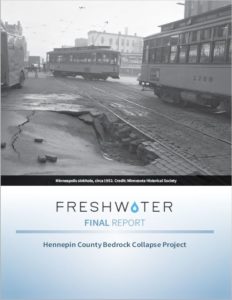 Hennepin County Bedrock Collapse Project (July 2021)
Hennepin County Bedrock Collapse Project (July 2021)
Hennepin County Emergency Management contracted Freshwater and Midwest Geological Consultants to identify areas where bedrock collapse could lead to sinkholes.
The County will use results of this investigation to highlight risk to the public, similar to their landslide atlas, allowing stakeholders to take action to mitigate that risk. Read the full report.
Water Conservation Advisor Training report on year 4 (July, 2020–June, 2021)
The goal of this project is to create a Water Conservation Advisor education and
training program to train a corps of Minnesota Water Stewards and other master level
volunteers who specialize in water conservation best practices. Trained Water
Conservation Advisors will be equipped to educate and engage both individuals and
local community groups—including neighbors, homeowner associations, schools,
churches, businesses, and others—in water conservation practices and complete
projects that enhance groundwater protection.
This report is a project update and final report. Read the full report.
Banking Groundwater: Managed Aquifer Recharge (February 2021) addresses the issue of the more than 75% of Minnesotans who rely on groundwater and may find it in short supply in the face of population, land-use, and climate change. Aquifer storage and recovery (ASR) is a technological approach to treat and inject clean water into an aquifer for temporary storage. This study examined four different kinds of aquifers across Minnesota with unique pressures to determine their suitability for ASR. Read an executive summary or the full report.
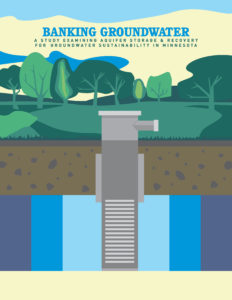 Banking Groundwater: Managed Aquifer Recharge (December 2020) addresses the issue of the more than 75% of Minnesotans who rely on groundwater and may find it in short supply in the face of population, land-use, and climate change. Aquifer storage and recovery (ASR) is a technological approach to treat and inject clean water into an aquifer for temporary storage.
Banking Groundwater: Managed Aquifer Recharge (December 2020) addresses the issue of the more than 75% of Minnesotans who rely on groundwater and may find it in short supply in the face of population, land-use, and climate change. Aquifer storage and recovery (ASR) is a technological approach to treat and inject clean water into an aquifer for temporary storage.
This study examined four different kinds of aquifers across Minnesota with unique pressures to determine their suitability for ASR. Read an executive summary or the full report.
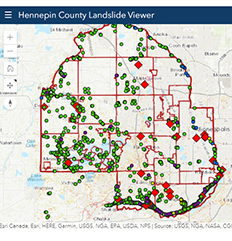 Hennepin County Interactive Landslide Map and Hazard Atlas (December 2020)
Hennepin County Interactive Landslide Map and Hazard Atlas (December 2020)
The Twin Cities has experienced an increase in landslide activity over the past decade as a result of increased precipitation.
This interactive map of landslides and atlas report can help watershed districts and cities manage surface water to reduce the risk of landslides.
Future Technical Service Area Management and Structure Analysis, June 30, 2020. The purpose of this project is to “evaluate the current state of TSA workload/need, structure, and management statewide. The project will also yield a set of findings and recommendations designed to bring efficiencies to TSA operations and to meet current and future demands for accelerated conservation implementation.”
Inspiring Action for Nonpoint Source Pollution Control (January 2020) offers a new approach for water resource protection, informed by systems thinking and a model of community capacity. Drawing on decades of engagement in conservation management and years of applied research on conservation behavior, this manual’s guiding principles for inspiring conservation action are backed by the latest social science and have been field-tested in Minnesota. Download.
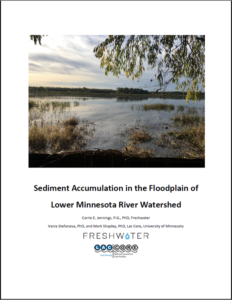 Sediment Accumulation in the Floodplain of Lower Minnesota River Watershed (June 2019) provides a direct assessment of sediment accumulation in the floodplain of Lower Minnesota River Watershed to better document how sedimentation in this reach has changed as a result of changes in flow in the post-settlement period. Download the report.
Sediment Accumulation in the Floodplain of Lower Minnesota River Watershed (June 2019) provides a direct assessment of sediment accumulation in the floodplain of Lower Minnesota River Watershed to better document how sedimentation in this reach has changed as a result of changes in flow in the post-settlement period. Download the report.
Minnesota’s focus on developing comprehensive watershed management plans through the One Watershed, One Plan (1W1P) program requires that local units of government (LGUs), such as soil and water conservation districts (SWCDs) include groundwater protection in local water planning. However, technical field staff and local elected officials need more tools to help them learn about local groundwater, solve local groundwater challenges, and communicate and work effectively with landowners. Read the full report.
 Putting Minnesota on a Clean Water Trajectory (January 2019), a summary of discussions among interest and agency representatives, convened by Freshwater, to assess Minnesota's progress on meeting its clean water goals and offer guidelines for the next ten years to the Clean Water Council and executive branch agencies. Download.
Putting Minnesota on a Clean Water Trajectory (January 2019), a summary of discussions among interest and agency representatives, convened by Freshwater, to assess Minnesota's progress on meeting its clean water goals and offer guidelines for the next ten years to the Clean Water Council and executive branch agencies. Download.
The goal of this project is to create a Water Conservation Advisor education and
training program to train a corps of Minnesota Water Stewards and other master level
volunteers who specialize in water conservation best practices. Trained Water
Conservation Advisors will be equipped to educate and engage both individuals and
local community groups—including neighbors, homeowner associations, schools,
churches, businesses, and others—in water conservation practices and complete
projects that enhance groundwater protection.
This report includes the curriculum design process, program pilot, and sustainability plan. Read the full report.
Guide To Lake Protection and Management (2019), a guide published by Freshwater and the Minnesota Pollution Control Agency that includes information on watersheds, the chemistry of lakes, exotic species, development of a lake management plan, and best management practices for preserving water quality. Download.
Community Clean-Ups For Water Quality (2019), a guide for how citizens can organize to fight phosphorus pollution by cleaning leaves and other organic debris from streets and storm sewer grates, developed by Freshwater and Friends of the Minnesota Valley. Download.
The Water Underground: Implications for Agriculture and Opportunities for Change (March 2018) covers sustainable use of groundwater through an agricultural lens. This third and final report in The Water Underground series makes recommendations for groundwater quantity and quality to manage shared resources. Download.
Groundwater and Agriculture: Insights From Farmers In Central Minnesota on How to Protect Both (2018)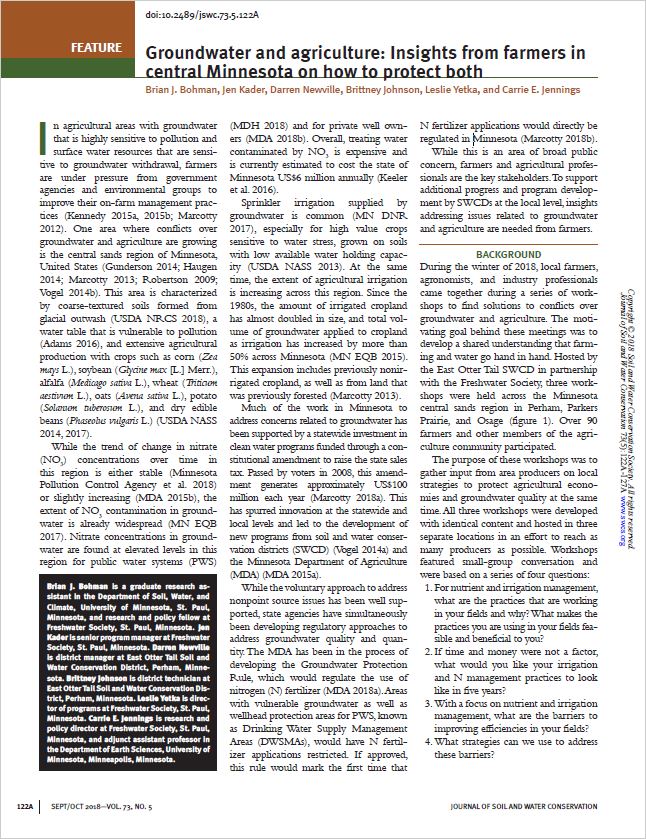
In agricultural areas with groundwater that is highly sensitive to pollution and surface water resources that are sensitive to groundwater withdrawal, farmers are under pressure from government agencies and environmental groups to improve their on-farm management practices (Kennedy 2015a, 2015b; Marcotty 2012). One area where conflicts over groundwater and agriculture are growing is the central sands region of Minnesota, United States (Gunderson 2014; Haugen 2014; Marcotty 2013; Robertson 2009; Vogel 2014b).
The Water Underground: Stretching Supplies (February 2017) focuses on three approaches to building groundwater resilience by stretching local supplies: reducing use, reusing water before discarding it, and recharging supplies. This second report in The Water Underground series makes recommendations focused on proven methods to manage supplies. Download.
Lower Minnesota River Fact Sheet (January 2017). Increased flows on the Minnesota river yield more sediment. Download.
Water Reuse Workshop Proceedings Report (July 2016), a report from Freshwater and Capitol Region Watershed District that summarizes the presentations and recommendations from a Water Reuse Workshop with 120 professionals from all sectors involved with reuse to discuss barriers and identify solutions. Download.
The Water Underground: Reframing the Local Groundwater Picture (March 2016) is targeted at public water supply managers. The first in Freshwater's The Water Underground series, this report tackles head on which portions of the state and metropolitan area currently have long-term water supply issues. Download.
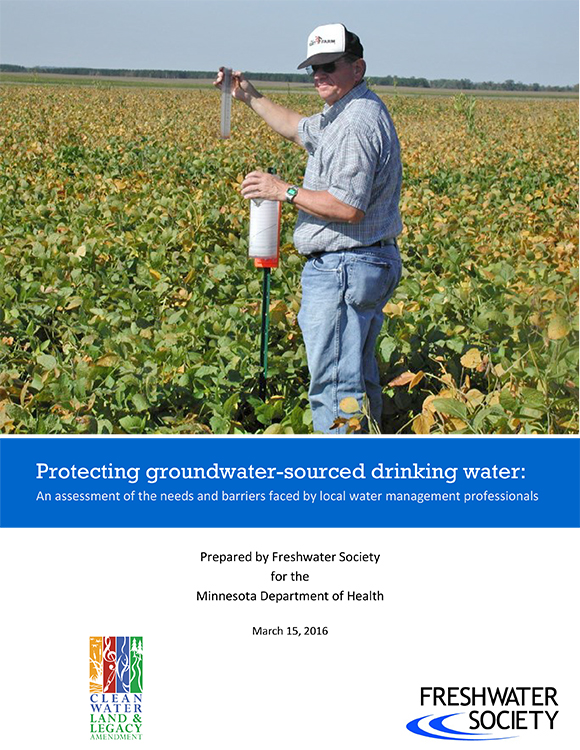 Protecting groundwater-sourced drinking water: An assessment of the needs and barriers faced by local water management professionals (March 2016), a study done by Freshwater for the Minnesota Department of Health that looks at how state-level agencies can best match resources with local needs to implement groundwater and drinking water protections. Download.
Protecting groundwater-sourced drinking water: An assessment of the needs and barriers faced by local water management professionals (March 2016), a study done by Freshwater for the Minnesota Department of Health that looks at how state-level agencies can best match resources with local needs to implement groundwater and drinking water protections. Download.
Advice From the Field: Preparing for county level buffer work (2016), a report on how local governments can prepare themselves for tackling the buffer challenge, based on discussions with 32 Soil and Water Conservation districts. Download.
Farm To Stream: Recommendations for accelerating soil and water stewardship (February 2015), a report on lessons learned from the Minnesota FarmWise program, which piloted a farmer-led approach to increasing participation in conservation farming practices. Download.
Minnesota’s Groundwater: Is our use sustainable? (April 2013), a Freshwater special report on groundwater use, estimates of increased pumping over time, expert opinions on the sustainability of that pumping, and problems in agency enforcement of requirement. Download.
Groundwater Sustainability: Towards a Common Understanding (May 2009)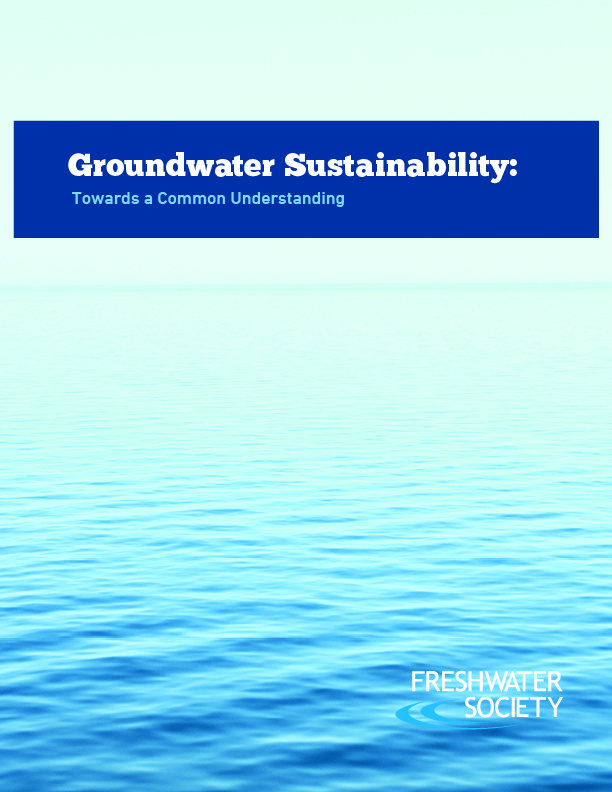 , a report that details discussions at two workshops, aimed at helping water scientists, planners and managers make decisions regarding how much groundwater they can — and should — pump. Download.
, a report that details discussions at two workshops, aimed at helping water scientists, planners and managers make decisions regarding how much groundwater they can — and should — pump. Download.
